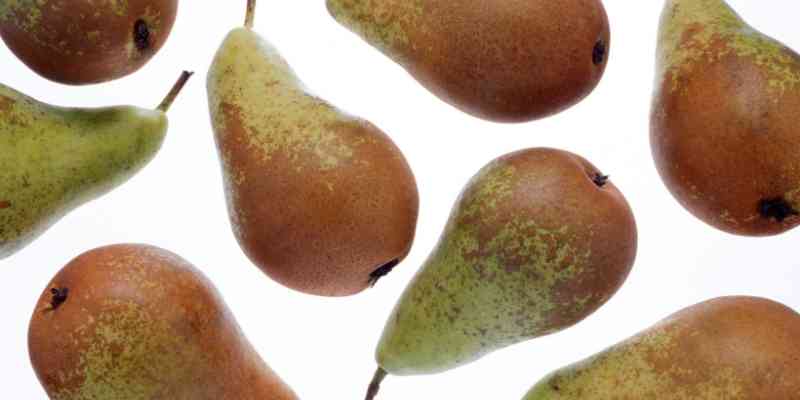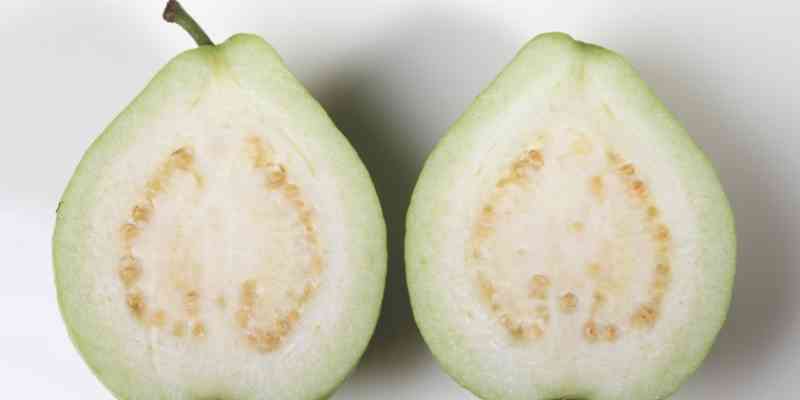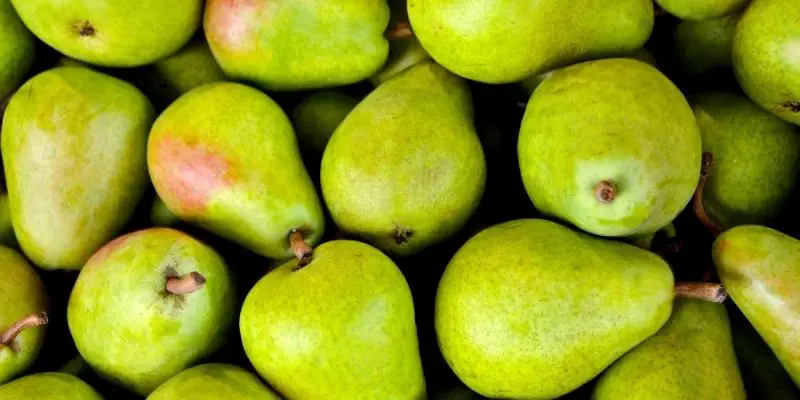Pears are wonderful. It’s juicy, delicious, relatively low in calories and rich in fiber and the whole range of vitamins and minerals. As calculated by the United States Department of Agriculture Agricultural Research Service, fresh pears have 57 calories per 100g serving, including 15.23g of carbs and 3.1g of fiber. And among those, healthy minerals are Calcium, Potassium, Magnesium, Vitamins A, C, Phosphorus, and folate, just to name a few. Sounds like something worth sharing with your pup? Let’s dig deeper.

So can dogs have pears?
Pears are recognized as being a safe and healthy treat for your pup by most vets. Though it is suggested that the total volume of fruits that you feed to your pet shouldn’t exceed 10% of his or her daily calories intake.

Are pears good for dogs?
Pears, packed with an array of nutrients, potentially can be quite beneficial for canine’s health. This fruit is rich in antioxidants, flavonoids, vitamins, and nutrients.

Pears are rich in potassium, that is great for maintaining a dog’s healthy blood pressure and heart rate. A lot of Vitamin C in the fruit might help to minimize the damaging impact of free radicals on the dog’s body cells. Vitamin C aids produce collagen, which protects your dog’s skin and keeps it younger. It also helps in the iron’s absorption when pups encounter this crucial nutrient in other plant-based dishes.
Fibers in pears reduce the risk of obesity, cardiovascular illnesses, and type 2 diabetes in dogs. It also supports your dog’s digestion.

Are pears bad for dogs?
As we’ve learned, pears are okay for dogs to eat if you’re keeping an eye on the serving size, but with some caveats. For instance, there’s always a chance that your dog might be allergic to pears.
There’s a theory explaining that. Some would say that pup have an intolerance to plan starch and Amygdalin that might be found in the fruit.
So first you have to figure out if your pup has an allergy before going full pears on him. To do that just feed him a tiny slice of first and watch his reaction. If nothing unusual happened, then you both are safe to proceed.
Another thing to keep in mind is the serving size. If your pup overeats pears it most likely to trigger some discomfort followed by stomach upsets. Eventually, it will wear off, but you both probably will better off without it.
That’s all for the fresh pears in general, but we will discuss other types of pears and some specific parts of the fruit below. Keep reading.

How about canned pears?
Canned fruits include copious amounts of chemicals that are not the healthiest choice for any dog’s diet. Preservatives are intended to prolong the shelf life of such products. Additional additives improve its flavor, decrease caloric value, etc.
To prove my point, let’s have a look at random brand of canned pears picked up on Amazon. The item is sugar-free (which is the case most of the times when we are talking about those supposedly super sweet unhealthy products) and includes the following ingredients: pears (dah!), water, vitamin C, sucralose and acesulfame potassium. The last two caught my attention, and you probably know that those are artificial sweeteners.
We all know the Xylitol is pure evil for the dogs, but how about those two? Well, after a couple of hours searching the web I’ve found the there’s not yet a general consensus about Sucralose (Splenda) and dogs and no authoritative sources signing up on a specific opinion. Several small blogs are saying that Sucralose is not toxic to dogs, like in this article a vet says it’s not poisonous and may lead to a stomach upset in the worst case, and some outrageous publications share the stories about thousands of dogs being killed because of Sucralose.
I won’t be vetting for any of these sides. Rather than stick to the opinion that this substance probably should be avoided and there’s DEFINITELY a lack of research related to this chemical. And one of the recent ones from North Carolina State University found that Sucralose produces unknown metabolites. And there were also some studies on animals with the shocking results that were not widespread in the media after the FDA’s approval of Sucralose.
For instance, “spontaneous abortions in nearly half the rabbit population given sucralose, compared to zero aborted pregnancies in the control group.” Wow. So yeah, let’s skip this one both for your pup and yourself.
As for acesulfame potassium known as acesulfame K, there’s also not that many pieces of research or clear claims about its safety. However, this paper Scientific Committee on Food caught my attention. It’s basically a reevaluation of the previous tests, proved that acesulfame K may lead to cancer, ran in 1985 and 1991.
The same institution decided to recheck the compound in 2000 and concluded that the previous results might not be valid. It does seem like a lobby to me. In any case, the initial paper clearly states that dogs are the most sensitive to this ingredient. And reevaluation tests didn’t include dogs in the third round of tests in 2000.
So yes, no canned pears. None for your pup, none for you. Please, be safe.

Can dogs eat pear cores and skins?
Avoid giving your dog pear cores and seeds. As with apple seeds, those contain cyanide toxins, for instance, Amygdalin. It’s is a cyanide-sugar compound that is degraded by the liver creating the poisonous composite Hydrogen Cyanide (HCN).

The levels of Amygdalin in pear seeds are not enough to develop toxic reactions in humans. And dogs also have a heightened tolerance to amygdalin exposure so it will take A LOT of seeds to affect them, but, this doesn’t eliminate the potential risks.
Pear seeds can also be responsible for choking accidents in dogs. Assure you get rid of both – cores and seeds -before sharing a pear with your dog.

And how about the skins?
Skin is probably the most delicious and nutritious pear’s part. But before serving pears to your pup, wash the fruit to eradicate any bits of chemicals left on the skin. Dogs are highly susceptible to most compounds utilized in agriculture as their livers are not that used to get rid of a large amount of ingested toxins. There were a lot of cases of canines deaths related to consuming of those agricultural chemicals reported. And this gloomy reality can be prevented simply by the washing pears before giving it to your pet.

Dogs and pears. Summary
Yes, pears are safe and healthy for your dog. But as always, moderation is vital. So what serving size are we talking about? Well, overall it’s not recommended to give your pup more than one slice at the time. And with that being said, don’t forget about other precautions: wash those pears thoroughly and get rid of the core, before sharing it with your four-legged friend.
Or even better, there are several quite popular dog products on the market that include pear along with other well-balanced ingredients crucial for your pup’s health. For instance, those two we’ve found on Amazon would be our best choice: Duck and Pears treat by Acana. Or treats made of duck, pears, and lentils by Best Bully Sticks (irresistible temptation even for the picky eaters as some buyers reported).
Thanks for the blog graphics: Canva.com


